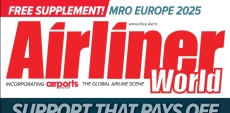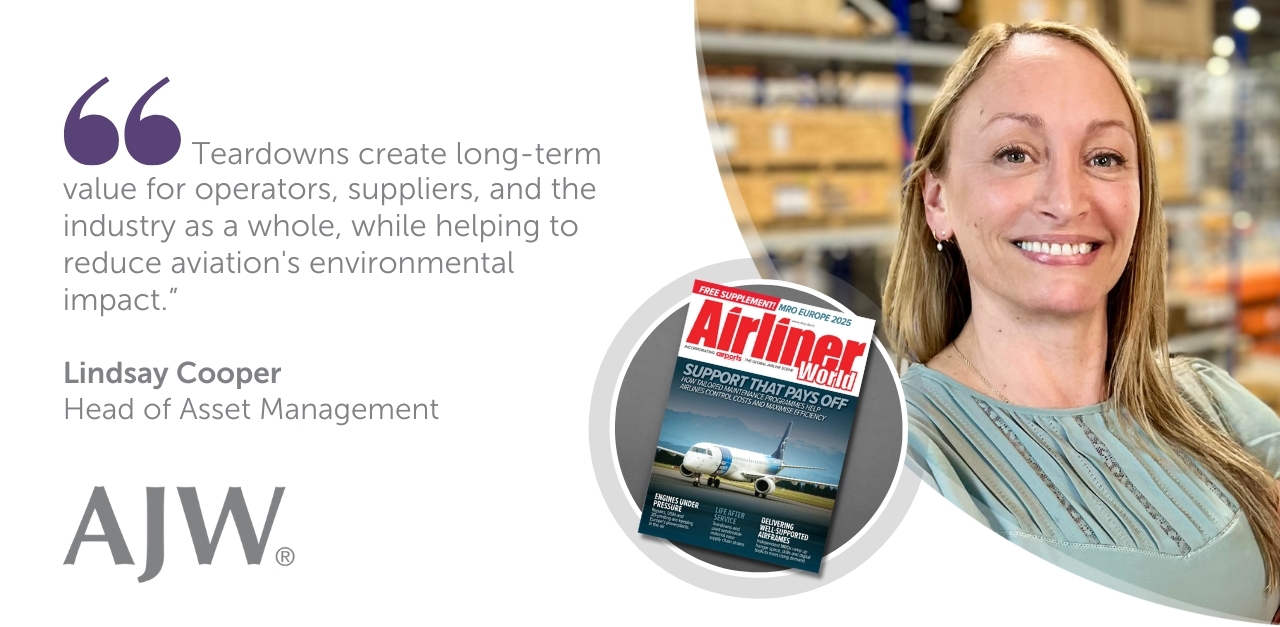

24/7 AOG Critical Response
Hotline![]() UK +44 1403 798888US +1 877 780 2008
UK +44 1403 798888US +1 877 780 2008
Our award winning global AOG service is manned 24 hours a day, 365 days a year.
Please call +44 1403 798888 or email aog@ajw-group.com.

13 Oct 2025

Taking aircraft apart for reusable parts isn’t a new practice, but teardowns have intensified sharply following almost five years of supply chain strain. How do teardowns support the supply chain?
Airliner World speaks to AJW Group’s Head of Asset Management, Lindsay Cooper, about the current dynamics of the teardown market.
Teardown activity shows no sign of decreasing any time soon, and “mature aircraft platforms remain a big part of this trend,” says Cooper. “Operators are looking to extend the life of their fleets and keep maintenance costs under control, especially with ongoing shortages of new parts.”
“Interestingly, we’re also tearing down younger aircraft,” she continues. “Engine reliability, sanctions, and shortages of spares have all played a role in the early retirement of certain aircraft types, such as the A320neo. The overlap between neo and ceo platforms means those teardowns are helping to provide operators with much-needed spare parts worldwide.”
Discussing future USM demand, Cooper suggests that it is likely to remain high until OEM production rates have fully recovered, which could take two or three years.
Even beyond this timescale, “longer-term pressures around sustainability and lifecycle cost management will make USM an even more integral part of fleet strategies,” the Head of Asset Management predicts. “The balance will keep shifting... but there’s no doubt that USM is here to stay as a cornerstone of the aviation supply chain.”
When it comes to how individual businesses respond to the market, Cooper notes that for AJW Group, the landscape has underscored the value of resilience and adaptability.
“We’ve been investing heavily in digitisation, while ensuring we’re ready to respond quickly as the market settles. Airlines are increasingly opting for Power-by-the-Hour (PBH) solutions... transferring risk to providers like us, with access to large pools of stock.”
Furthermore, AJW Group has its own in-house repair capabilities at AJW Technique, which are reinforced by partnerships with third-party MROs, meaning it can efficiently and reliably manage repairs and component supply.
“The market is incredibly active, and for those of us who can scale, innovate, and adapt, there’s a real opportunity not just to navigate the disruption, but to help shape a more sustainable and resilient aftermarket for the future.”

Moving on to the factors that contribute to a successful teardown, Cooper emphasises the importance of striking the right balance between acquisition cost and commercial return.
Before any components are moved, AJW will appraise the aircraft’s value and condition, then create a component harvest list using historic data, repair costs, and fair market analysis to ensure the business case is viable.
Once disassembly begins, it usually starts with realising the value of major assets. Key demand drivers, such as landing gear, nacelles, and APU, are moved through the repair loop and into available inventory as fast as possible. Every part removed is carefully cross-checked against the harvest list and its associated records.
Cooper states that “done properly, this process crystalises the value of the asset and ensures quality parts re-enter the supply chain safely, sustainably, and with full traceability.”
“The risk of unapproved parts re-entering the market is a serious concern across the industry. As a crucial safeguard, data plates are etched and removed, and items are punctured, to ensure unusable parts that will be scrapped can never make their way back into service,” Cooper affirms.
AJW is part of the United Nations Global Compact (UNGC), and Cooper confirms that the company prioritise repair, reuse, and recycling wherever possible. AJW essentially acts as a recycling hub for aircraft, redirecting valuable materials and parts into maintenance, repair, and overhaul rather than letting them go to waste.
Cooper concludes by stating that teardown is all about “creating long-term value for everyone involved, operators, suppliers, and the industry as a whole, while reducing aviation’s environmental impact.”
Want to tap into AJW Group’s strategically placed inventory pool worth over $500M USD? Get in touch today.